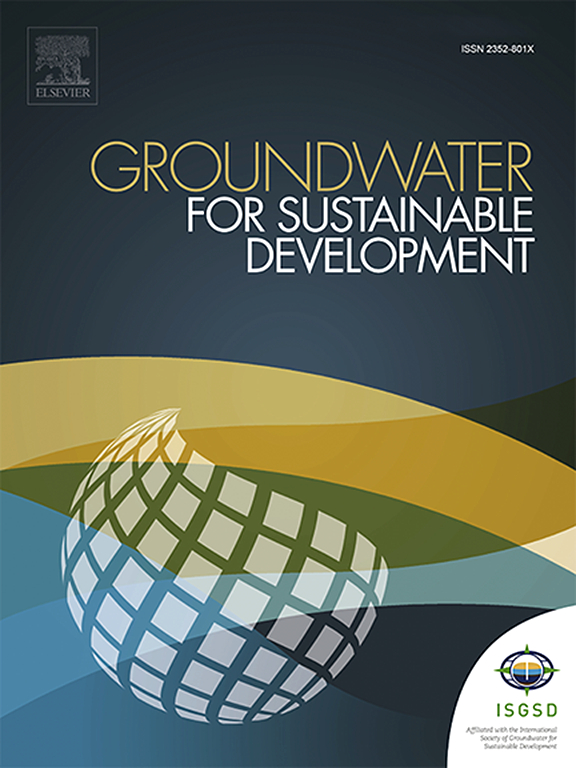Economic perspectives on groundwater conservation: Insights from farmers in western Uttar Pradesh, India
IF 4.9
Q2 ENGINEERING, ENVIRONMENTAL
引用次数: 0
Abstract
Groundwater management for irrigation is a critical area of research, particularly in developing economies like India where agriculture is heavily dependent on this resource. In India, groundwater is governed by the rule of capture, such that groundwater beneath an individual's land is treated as a private resource. This open-access nature leads to overexploitation and presents significant challenges for effective regulation. The present study seeks to assess the farmers' preferences for groundwater management alternatives and their marginal willingness to pay (MWTP) for sustaining the groundwater resources. Employing the contingent ranking method and rank-ordered logit model, the analysis is based on primary data from 300 farm households in Western Uttar Pradesh, India. Findings show that farmers prefer the groundwater management alternative of metered private tube wells, despite its higher cost, because their MWTP for this attribute is the highest. This suggests a strong preference for maintaining private rights to groundwater extraction while supporting sustainability through per-unit consumption charge. Farmers exhibit a significant MWTP of INR 1718 (USD 20.48) annually for the non-use benefits of groundwater. While this WTP may seem modest compared to the intrinsic value of groundwater's non-use benefits, it marks a critical step toward organised groundwater governance. Furthermore, farmer characteristics—such as education level and landholding size—significantly influence their preferences for various groundwater management attributes. These findings underscore the importance of policy interventions that incorporate economic incentives alongside conservation goals to address the ongoing groundwater depletion in agrarian economies like India.

地下水保护的经济视角:来自印度西部北方邦农民的见解
用于灌溉的地下水管理是一个关键的研究领域,特别是在农业严重依赖地下水资源的印度等发展中经济体。在印度,地下水是由捕获规则管理的,因此,个人土地下的地下水被视为私人资源。这种开放获取的性质导致了过度开发,并对有效监管提出了重大挑战。本研究旨在评估农民对地下水管理方案的偏好及其维持地下水资源的边际支付意愿。采用偶然排序法和秩序logit模型,分析基于印度西部北方邦300个农户的原始数据。研究结果表明,尽管成本较高,但农民更喜欢计量私人管井的地下水管理替代方案,因为他们对这一属性的MWTP最高。这表明强烈倾向于维护地下水开采的私人权利,同时通过单位消费收费支持可持续性。由于地下水的非使用效益,农民每年的最大用水量为1718印度卢比(20.48美元)。虽然与地下水的非利用效益的内在价值相比,这个WTP可能显得微不足道,但它标志着向有组织的地下水治理迈出了关键的一步。此外,农民特征(如教育水平和土地持有规模)显著影响他们对各种地下水管理属性的偏好。这些发现强调了政策干预的重要性,将经济激励与保护目标结合起来,以解决像印度这样的农业经济体持续的地下水枯竭问题。
本文章由计算机程序翻译,如有差异,请以英文原文为准。
求助全文
约1分钟内获得全文
求助全文
来源期刊

Groundwater for Sustainable Development
Social Sciences-Geography, Planning and Development
CiteScore
11.50
自引率
10.20%
发文量
152
期刊介绍:
Groundwater for Sustainable Development is directed to different stakeholders and professionals, including government and non-governmental organizations, international funding agencies, universities, public water institutions, public health and other public/private sector professionals, and other relevant institutions. It is aimed at professionals, academics and students in the fields of disciplines such as: groundwater and its connection to surface hydrology and environment, soil sciences, engineering, ecology, microbiology, atmospheric sciences, analytical chemistry, hydro-engineering, water technology, environmental ethics, economics, public health, policy, as well as social sciences, legal disciplines, or any other area connected with water issues. The objectives of this journal are to facilitate: • The improvement of effective and sustainable management of water resources across the globe. • The improvement of human access to groundwater resources in adequate quantity and good quality. • The meeting of the increasing demand for drinking and irrigation water needed for food security to contribute to a social and economically sound human development. • The creation of a global inter- and multidisciplinary platform and forum to improve our understanding of groundwater resources and to advocate their effective and sustainable management and protection against contamination. • Interdisciplinary information exchange and to stimulate scientific research in the fields of groundwater related sciences and social and health sciences required to achieve the United Nations Millennium Development Goals for sustainable development.
 求助内容:
求助内容: 应助结果提醒方式:
应助结果提醒方式:


